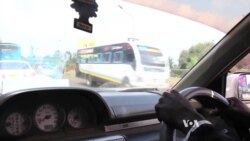The taxi-like online company Uber has begun a first-of-its-kind African pilot project where deaf drivers in Nairobi use its app.
Driver Benard Mulama intently goes through his phone. For the past week he’s been getting familiar with the Uber App.
Mulama, who is deaf, is in a pilot project encouraging the hearing impaired to use the smartphone app that connects riders to drivers.
It's a collaboration between Uber and the Kenya National Association of the Deaf (KNAD).
Connecting drivers, riders
In the field, the Uber app works seamlessly with a flash prompt appearing on the smartphone alerting the driver of a potential client.
For Mulama, the application means that more deaf drivers will overcome hurdles and venture into a business that was once the preserve of only the hearing.
“Well, many deaf drivers driving taxis normally have problems in getting a personal service vehicle [PSV] license," he said. "But getting a private car license is easy since the police normally give licenses to private car owners who are deaf.”
The chairman of KNAD said the Uber app helps to level the playing field somewhat.
“We partnered with Uber because many deaf drivers do not have the opportunity to drive due to the attitude of policemen. Through the Uber app we will be able to influence and enable deaf people to drive,” said KNAD Chairman Nickson Kakiri.
Ease of use
The Uber app is relatively easy to use. The rider keys in their pickup location and the driver accepts the request once the phone flashes. Once the rider is picked up the Uber App automatically charges the fare —75 cents per kilometer.
Uber's manager in Kenya says the new revenue stream is a motivational factor.
“We both see the power of technology to offer greater income opportunities to deaf and hard of hearing people who typically don’t have access to that many income opportunities, especially in cities like Nairobi," said Alastair Curtis, Uber general manager.
According to the Kenya Sign Language Interpreters Association, there are more than 600,000 hearing-impaired people in Kenya.





